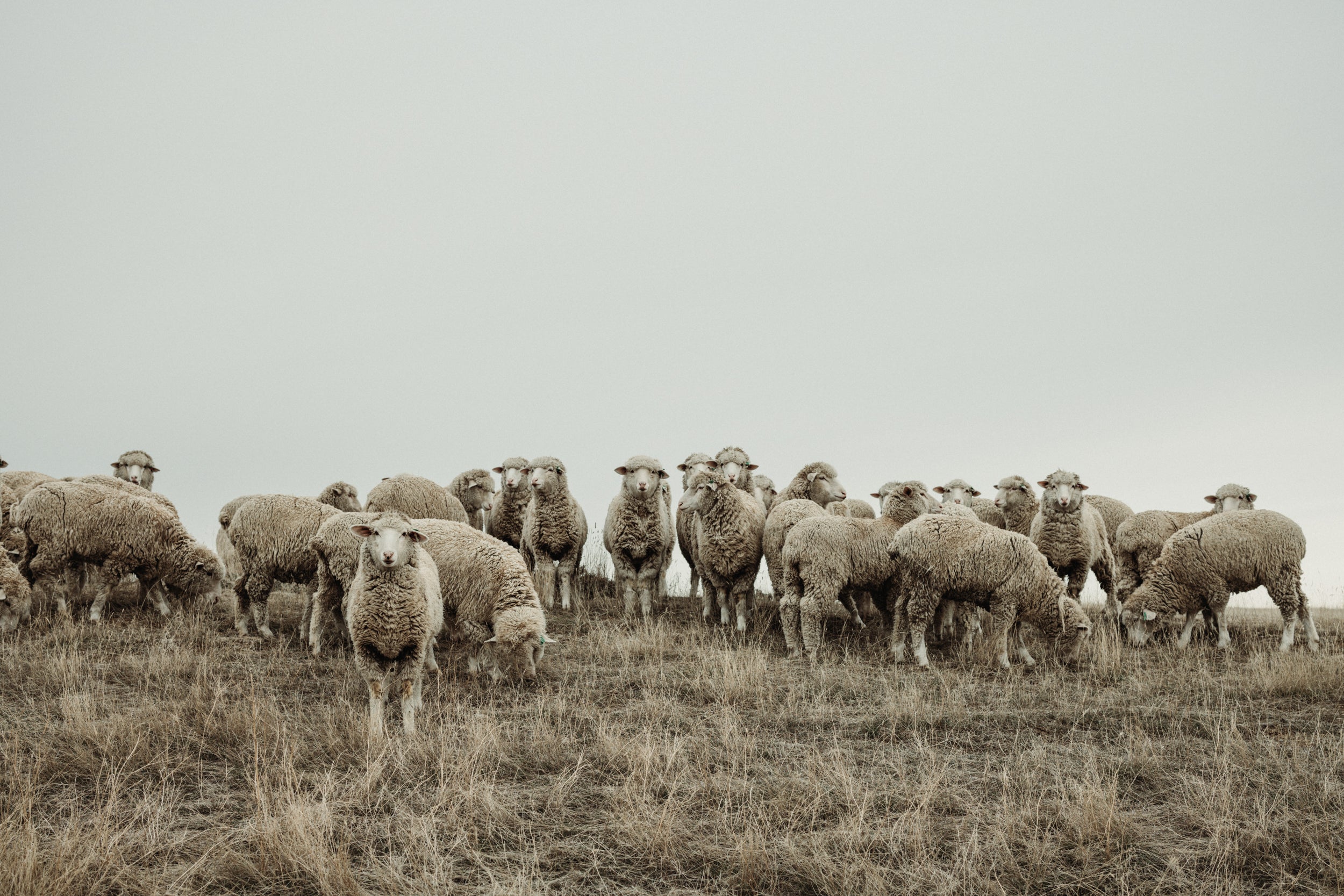Start to Finish
How long does it take to make a WeatherWool garment, from start to finish? A year to a year-and-a-half, but that's just the WeatherWool part. The Ranchers start their work years before we do!
This page presents the main steps and the timeline. A separate page, How WeatherWool is Made, details each of these steps and many others, and introduces the many companies and professionals that help in the process.
- In Spring of each year our Ranchers examine the performance records of each ewe and determine which ram will be a suitable sire for her next lambs. This process begins in June. Click for some photos and discussion of these events on PM Ranch in Minnesota in 2018.
- Nearly a year later, in late April or May (on PM Ranch), lambs are born. [Let's say 1 year has passed.]
- When the lambs are almost one year old, they are shorn for the first time. Normally, the wool grown in a sheep's first year is finer (thinner) than the wool grown later in life, and so ewes that have been bred for us often do not produce fiber we can use at their first shearing. But we do sometimes buy lamb's wool. [Two years have passed.]
- When the grown lamb is a 2-year old ewe, it is shorn again, and this will usually be the first time it will produce fiber that we can use. [Three years have passed.]
- A few things have to happen before we actually can take possession of the wool. The fleece must be:
- baled
- transported to Roswell Wool in New Mexico, although we have begun to source wool from Wyoming that does not go through Roswell
- greasy (raw) wool must be sampled for testing ... at Roswell or in Wyoming
- samples sent to the lab. The testing is done at the New Zealand Wool Testing Authority because the USA's only lab that did all the tests we need closed in 2019. The University of Texas did some testing for us as of 2023, but the "length and strength" testing still was in NZ.
- Test results returned to Roswell and to us. We have a login at NZWTA, so we can see online all the results for the batches we are considering for purchase
- Roswell compiles the auction materials (information on the origin and size of each lot of wool and all the test results)
- Roswell holds the auction
- We hopefully win the clips we seek. Sometimes we will purchase our fiber by Private Treaty prior to the auction
- WeatherWool pays for the wool. This is when WeatherWool begins to incur costs, and we are responsible for all the costs hereafter. We also pick up the costs for testing of the fiber we buy
All told, a good four-and-a-half years from planning the breeding of a ewe and ram to a finished garment made from the fleece of their offspring. And about 18 months from when WeatherWool gets involved until we have finished garments.
This timeline can be further dilated by downtime. The scouring plant, the dyers, the tailors, the spinners, the weavers, the finishers … all of these pros are serving many other customers and so we may need to wait weeks or more before they are ready to work on WeatherWool. Or there may be personnel or equipment problems that cause delays. Much of the garment industry shuts down for a week or two in July.
The timeline also does not include potential supply-chain bottlenecks. Because some of our supplies, such as zippers and thread and buttons may have a lead time of months, we need to keep large surpluses on hand in order to be sure our operations are not held up.
Our Ranchers will begin working on WeatherWool more than three years before they actually get paid. And WeatherWool will be out of pocket for about 18 months before we have finished garments. That is, it takes a year-and-a-half from the time we purchase raw wool from the Ranchers until our customers purchase finished garments.
This sounds like (and certainly FEELS like!) a very long time to me, but I don't have any other frame of reference.
As WeatherWool grows, we will be working more and more closely with our Ranchers and all our Partners.
There are still other significant wrinkles in the production. Sometimes the weavers or knitters won't like the cones on which yarn has been delivered ... won't feed through their machines smoothly. Reconing yarns can take significant time! (And not free, either.) Also, because our warp and weft yarns (warp runs lengthwise, weft runs horizontal) are spun differently, it's almost a certainty that when the weaving is done, we'll have some warp or some weft left over. That's not a delay, but it is a big deal! It's expensive stuff, and we need to figure out what to do with it. The leftover yarns may not be used for yet another year or two.
THANKS to Advisor Bob Padula for the Rancher-section of the timeline.
24 May 2025 --- Ralph

